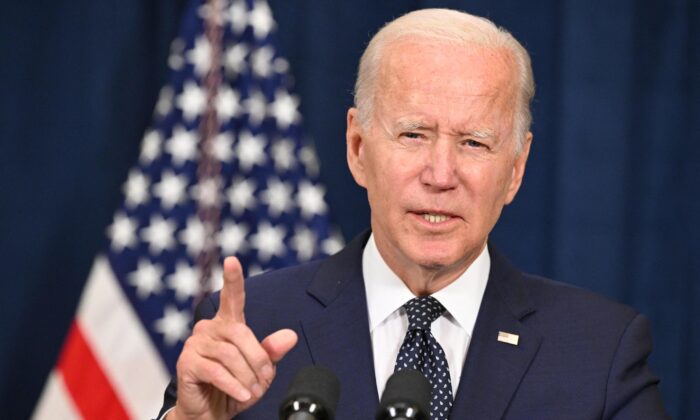By Gary Bai
The U.S. Supreme Court gave Texas and Louisiana a temporary legal victory in the border states’ attempt to strike down a September 2021 Biden administration immigration guideline.
The Supreme Court, in a ruling without explanation on Thursday, allowed a federal judge in Texas to block the Biden Administration’s immigration guideline that, according to the border states’ prosecutors, limits the ability of border agents to detain and deport illegal aliens.
The ruling is a political setback for the Biden administration as it tries to juggle an unprecedented surge in illegal immigration, overburdened Immigration and Customs Enforcement (ICE), and an agenda to replace the Trump administration’s more stringent border policy amid bipartisan criticism.
Dissenting justices include Justice Amy Coney Barrett, Justice Sonia Sotomayor, Justice Elena Kagan, and Justice Ketanji Brown Jackson—marking Jackson’s first vote since the start of her tenure last month.
DHS Guidelines
The DHS issued the new immigration enforcement guidelines in late September 2021, directing immigration authorities to exercise “discretion” and prioritize detaining or deporting illegal aliens who “pose a threat to national security, public safety, and border security.”
Put into practice, the September 2021 guideline designates that an illegal alien’s lack of legal authorization to stay in the United States “should not alone be the basis of an enforcement action against them.”
This guidance is in direct contrast with the Trump-era DHS policy, which guides immigration authorities to detain and deport illegal aliens in a non-discriminatory manner, except in certain limited cases, such as those who came to the United States as children or are parents of U.S. citizens or permanent residents.
The high court’s ruling, which upheld a federal court’s ruling in June 2022 vacating the Biden administration’s September 2021 DHS guidance, gives Texas and Louisiana a temporary victory, at least until the Supreme Court hears the case in the December 2022 argument session.
‘Uncontroverted Evidence’
According to Trump-nominated Judge Drew Tipton from the Texas District Court for the Southern District, it is “difficult to deny” that the DHS’s September 2021 memo inflicted harm on the state of Texas.
Tipton sided with the border states in saying that “uncontroverted evidence” shows that the September 2021 memo led to an increase in the flow of illegal immigrants into Texas, with the state needing to spend more money on prosecution, detainment, healthcare, and administration.
The district court continued by saying that while the DHS argues that some immigration data showed an increase in the number of arrests and expulsions following its guidance to “prioritize” criminally convicted aliens, the increase is disproportionate considering the “unprecedented surge of illegal aliens pouring over the border.”
“Given that the number of encounters with illegal border-crossers is ten times what it was in April 2020 … an increase in arrests and expulsions is far from impressive, especially if … roughly three-fourths of the illegal aliens that cross the border go undetected by DHS entirely,” Tipton wrote.
Border States Sue
The ever-escalating legal clash between the border states and the Biden Administration began two days after Biden took office.
Texas, on Jan. 22, 2021, sought a court injunction on a January 20 DHS memorandum that the state attorney general said suspended the deportation of the “vast majority of illegal aliens without any consideration for individual circumstances.”
As the case spiraled in the courts, the DHS issued a new set of immigration guidelines in February 2021 and yet another in September 2021—the last of which Texas and Louisiana sued in Texas’s District Court for the Southern District.
Tipton sided with the border state attorneys general and ruled in June 2022 that the federal government may not “require its officials to act in a manner that conflicts with a statutory mandate imposed by Congress.
Texas and Louisiana showed that the DHS’s September 2021 guidance, Tipton continued, is “contrary to law,” “arbitrary and capricious,” and “failed to observe” necessary government procedure.
“Using the words ‘discretion’ and ‘prioritization,’ the Executive Branch claims the authority to suspend statutory mandates,” Tipton wrote. “The law does not sanction this approach.”
Split Courts
After Tipton’s ruling, the Biden administration appealed to a three-judge panel—unsuccessfully.
The judges at the Court of Appeals for the Fifth Circuit, in an unsigned opinion dated July 6, 2022, wrote that some of the Biden administration’s concerns advanced in its September 2021 guidelines—particularly those replacing “Congress’s statutory mandates—are “extralegal” and “plainly outside of the bounds of power” conferred to Congress by the Immigration and Nationality Act.
“For example, it provides that the guidelines ‘are essential to advancing this administration’s stated commitment to advancing equity for all, including people of color and others who have been historically underserved, marginalized and adversely affected by persistent poverty and inequality,’” the panel wrote.
The Fifth Circuit ruling came a day after a polar opposite ruling by the Court of Appeals for the Sixth Circuit on a similar case, in which Arizona, Ohio, and Montana sued the Biden administration on the same grounds.
Chief Judge Jeffrey Sutton, a Bush-appointed judge, sided with the Biden administration, opining in the ruling that the Biden administration, like previous governments, is given “considerable authority” by federal law to shape immigration policy and, therefore, guidelines for detention and removal of illegal immigrants.
The Fifth Circuit court, in explaining its differing opinion with the Sixth Circuit, said that precedent supports its conclusions and that “fulsome fact-findings” from the lower court support Texas’s and Louisiana’s standing.
In an email statement to The Epoch Times, a spokesperson from the DHS said it “is obligated to and will continue to abide” by the Texas District Court’s decision regarding its September 2021 guidelines “as long as the decision remains in effect.”
“In the interim, ICE officers will make enforcement decisions on a case-by-case basis in a professional and responsible manner, informed by their experience as law enforcement officials and in a way that best protects against the greatest threats to the homeland,” the spokesperson added.
The Texas attorney general celebrated the Supreme Court’s ruling as “another win” for Texas and border security.
“Yesterday the Supreme Court made clear that, while we prepare for oral argument this winter, the Biden Administration must detain illegal aliens with criminal convictions,” Paxton said in a July 22 press release.
“It’s the right legal decision, and it’s what’s best for Texas and our nation.”






